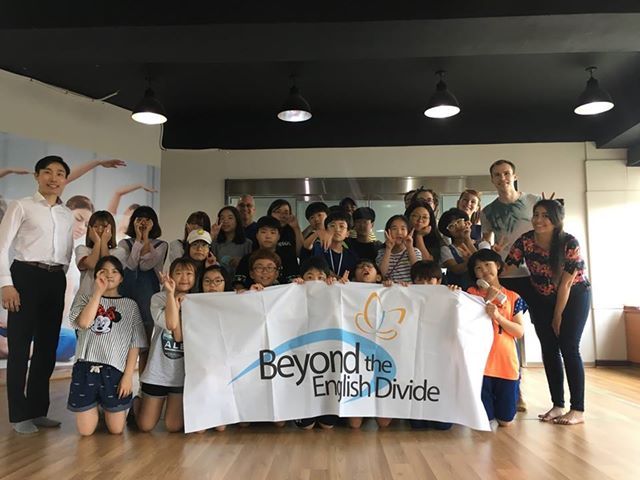As expenditure on private education continues to soar, a volunteer group is determined to narrow the English divide.
Every second and fourth Saturday of the month, Bruce Lee leads a small group of native English speakers to an outer neighborhood in Seoul to offer a free English class for underprivileged children.
The nonprofit group, called Beyond the English Divide, is the brain child of Lee. Since its first volunteering session in October 2017, the group’s services have experienced strong growth in demand, and it now holds regular sessions totaling over 50 students across three locations in Seoul.
“These kids are from underprivileged families who cannot afford private English tutors outside of school,” Lee said before commencing the English class at one of its regular locations at the Gangbuk District Youth Training Center.
Around 30 elementary students attended that morning. There was an emphasis on developing conversational skills through games and activities.
After some warmup games, the students split into smaller groups of four or five led by volunteers to work on worksheets designed by Lee and his team specifically for this initiative.
 |
Caption: Students and volunteers of Beyond the English Divide pose for a photo at the July English class. (Aaron Yip/The Korea Herald) |
Lee tried to cover as many bases as possible in the two-hour period, from speaking to writing and comprehension. The primary goal of the class was to provide students with opportunities to interact with native English speakers -- something of a luxury for many of them.
Lee worked with the center to ensure their resources are well-used. Students across the three teaching locations all hail from either low-income families or multicultural backgrounds, or are orphans.
The enrollment policy is guided by the organization’s vision of narrowing the “English divide” in South Korea by helping underprivileged children practice English. According to Lee, the divide stems from unequal opportunities in studying English, which reduces access to jobs and further education, ultimately widening the gap between the rich and the poor.
According to a recent report from the country’s statistics agency and Education Ministry, South Koreans spent a monthly average of 384,000 won ($343) per child on private tutoring in 2017, a 33 percent increase compared to 10 years ago.
But over the same period, the percentage of children from low-income families receiving private education fell sharply.
This is compounded by the Ministry of Education’s ban on after-school English classes for first and second grade elementary students.
The ban has not lessened demand for English lessons, but it has pushed those families who can afford it to send their kids to private classes.
Milly, a private English tutor from the US, said she had received more inquiries from families with young children since the ban’s implementation.
Noting many of her newest clients seem “quite well off,” she added, “I don’t necessarily agree with the ban, even though it’s good for the private tutoring business because it’s easier to learn a language when we are still young.”
Lee hopes his initiative can fill that gap and narrow the divide.
At the Gangbuk Youth Center it was clear the students did not treat the class as a chore, and engaged enthusiastically with all activities.
Lee and the volunteers work hard to ensure the space is nonjudgmental and fair, as mistakes are not shamed and each student is encouraged to participate.
“Many parents are telling me that their son and daughter feel more comfortable communicating in English with foreign teachers,” Lee said.
The English class was an equally rewarding experience for the volunteers. Andreea, a regular volunteer and in charge of curriculum development, believed that it “not only gives me a chance to give back to this society, but it’s also a great source of learning for myself.”
A similar sentiment was echoed by Steve, who serves in the US military. “I was involved in my son’s scout (troop) back in the states before coming here. So when I moved here, I looked for ways to give back. It was like second nature.”
When quizzed about future plans for the group, Lee simply replied “to make it grow in a sustainable way, so that we can reach more people in need.”
For those interested in learning more about the work of Beyond the English Divide, information can be found at the group’s Facebook page.
By Aaron Yip, intern reporter
(
aaron.yhla@heraldcorp.com)








